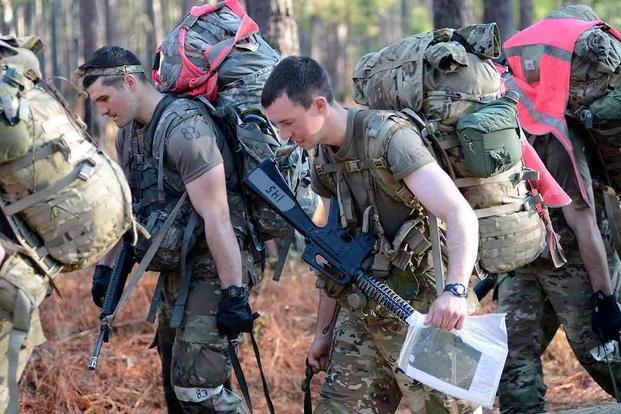Being accepted and successful in any special operations selection program requires two specific training phases. Where most people fail is that they neglect to consider that they have to pass a fitness test to enter the training pipeline, so they have to spend a lot of time preparing specifically to get through it. .
This requires smart and effective training programs specific to the goals you seek, the ability to recover quickly and quickly repeat similar high-intensity performances, and healthy nutrition – long before you join the military.
Recent findings suggest that performing well on Special Forces Assessment and Selection (SFAS) may be related to the type of diet and physical performance you have.
If you want to see peak performance in your training, learning how to eat well and sleep well every day will help you see the results you need to get. For And through selections. Mastering these two recovery methods will handle over 90% of your recovery needs. The missing 10% can be found with active recovery methods, such as end-of-day stretching, mobility training, massage, contrast (hot/cold) baths, and relaxation.
LISTEN: Podcast with Lt. Col. Nick Barringer PhD Nutritionist on foods for peak performance.
A recent study was conducted to examine the relationship between diet and physical performance with selection for special forces training. This study looked at metabolites in the blood of soldiers who were screened for SFAS and compared them to soldiers who weren’t screened.
Several hundred types of metabolites in the human body were measured in this study. The most common metabolites associated with intense physical performance are carbon dioxide, ammonia, amino acids and lactate/lactic acid. However, the common chemical markers that indicated success or failure were evident when the body was breaking down food or its own tissues (fat or muscle) to produce energy.
In high-intensity or stressful situations, such as special ops selections, candidates metabolize all possible fuels into energy at higher than normal rates. This process, called metabolism, makes the energy and materials needed for physical and mental performance and recovery. The results were clear:
“The successful candidates selected during the SFAS had higher pre-SFAS circulating metabolite levels, which allowed the candidates to be more resistant to oxidative stress, perform higher physical performance and have a better diet. quality. In contrast, unselected candidates had higher levels of metabolites, potentially indicating high oxidative stress.
These results indicate that soldiers who have been selected for Special Forces Continuing Education enter the SFAS course with metabolites associated with healthier diets and better physical performance through improved diets, training program efficient physique and the ability to recover quickly. Additionally, the unselected candidates had higher levels of metabolites that may indicate elevated oxidative stress, which could result from poor nutrition, non-functional overexertion/overtraining, or incomplete recovery from prior physical activity. .”
These results suggest that if you want to give yourself the best chance of being selected for special forces training, you need to focus on healthy eating and engaging in performance-enhancing physical activities.
A balanced diet rich in fruits and vegetables, along with lean proteins and healthy fats, can help you get the nutrients you need to perform at your best. Additionally, engaging in physical activities such as running or rucking, strength training, calisthenics, and interval training can help you develop the physical fitness you need to be successful in the selection of special forces.
These stress-reducing compounds, measured as metabolites, are found in fruits and vegetables rich in dietary antioxidants (vitamins C, E, and beta-carotene, etc.), potentially contributing to the observed differences in oxidative stress metabolites.
Benefits of antioxidants in such training programs:
- They reduce oxidative stress.
- They help in the functioning of the brain.
- They can reduce inflammation.
Another aspect of nutrition is getting as much food as possible from breeding programs. Your day-to-day performance largely depends on how often you drink water, consume electrolytes, and how much you can eat when offered food.
Do not skimp on eating or drinking as they are your fuel to run the engine. When sleep and recovery are minimized in these programs to test your mettle, your diet is what will separate you from those who are able or unable to perform.
With the right training, diet, and preparation for recovery, you can increase your chances of performing well in the Special Forces selection. Reaching the level needed to be successful at selection requires several months to a year of focused physical training and smart nutrition and recovery practices.
All in all, if you’re looking for ways to stand out from the competition and give yourself the best chance of being selected for Army Special Forces training, focusing on your diet and physical performance is the way to go. key to success.
Stew Smith is a former Navy SEAL and fitness author Certified as a Strength and Conditioning Specialist (CSCS) with the National Strength and Conditioning Association. Visit his Fitness eBook store if you’re looking to start a workout program to create a healthy lifestyle. Send your fitness questions to [email protected].
Want to know more about veteran jobs?
Be sure to get the latest news on post-military careers as well as essential information on veteran jobs and all the benefits of service. Subscribe to Military.com and receive personalized updates straight to your inbox.
Show full article

